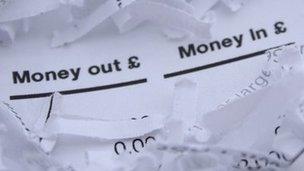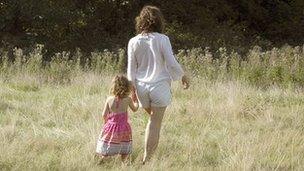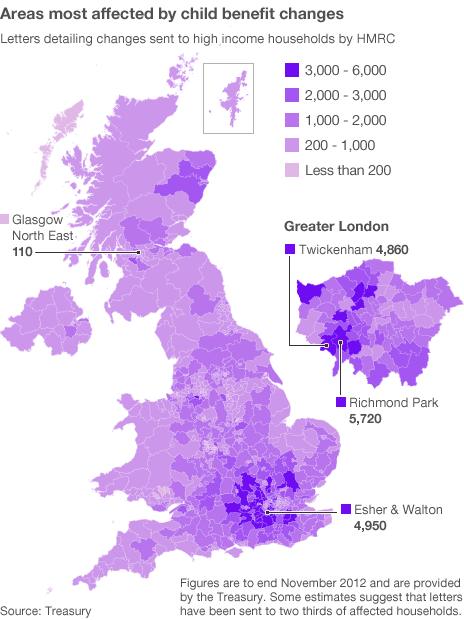Q&A: Child benefit changes
- Published

Child benefit amounts to £20.30 a week for an eldest or only child
Child benefit is no longer available to all parents. Changes to the rules which came into force at the start of 2013 reduced the entitlement of about 1.2 million families.
Families where one parent is earning more than £50,000 a year are no longer be able to claim the total amount of child benefit.
The rules include an expectation that couples disclose to each other whether they claim child benefit, or earn above £50,000 a year.
How much is child benefit worth?
Child benefit, external is a tax-free payment that is aimed at helping parents cope with the cost of bringing up children.
One parent can claim £20.50 a week for an eldest or only child and £13.55 a week for each of their other children.
The payments apply to all children aged under 16 and in some cases until they are 20 years old.
The system is administered by HM Revenue and Customs (HMRC) which pays out to nearly 7.9 million families, with 13.7 million children.
How has this eligibility changed?
This had been available to every family with children.
But in the 2012 Budget, Chancellor George Osborne announced an amended plan to steadily withdraw child benefit from families where one parent earns more than £50,000.
In detail, the benefit received will be recouped gradually as the income of the highest earning parent rises above £50,000, with the child benefit being eroded completely once their income is £60,000 or more.
This change came into effect on 7 January 2013.
How does that work?
In one of two ways.
If one of the parents earns more than £60,000, they may choose to stop claiming child benefit, or persuade their partner to do so, and save the tax authority the trouble of getting it back.

A parent who earns more than £60,000 and who continues to claim child benefit will be taxed
If they or their partner keeps claiming it, then the higher earner will have to admit this in a self-assessment tax form.
Then, HMRC will tax the high earner, external on the child benefit which they, or their partner, claims.
So, the high earner will need to know whether their partner is claiming child benefit, because it will be the high earner who is taxed.
In the course of that conversation, it is likely that couples will discuss how much they earn and what they claim.
For those where one parent earns more than £50,000, it is likely that they will remain claiming and then have a proportion charged back by the tax authority. This will mean that they have to complete a self-assessment form.
Does that mean couples need to be honest with each other?
Exactly.

Only one parent can receive child benefit on behalf of their son or daughter
HMRC says it will "expect" couples to give each other basic financial details to see if they must be taxed.
HMRC will also let taxpayers ask for rudimentary information from its records to see whether or not their partners receive child benefit, or have an "adjusted net income" above £50,000, and should be paying the new tax.
This runs counter to the general principle of taxpayer confidentiality, which has been a formal part of the income tax system since 1803, as well as against the policy of separate taxation of married couples which has been in place since 1991.
But HMRC says its rules give it the authority to do this.
Is that a problem?
Not necessarily, and certainly not when couples are already open with each other about financial matters.
But there may be cases when couples want to maintain some privacy between each other, for example, if their relationship has broken down.
So who claims child benefit if a couple has split up?
Both parents might try to claim, even if they live apart, but only one of them will get it.
If somebody is responsible for a child, they normally get the benefit for it. So, usually, the parent with whom the child lives receives the benefit.
However, the other parent can get child benefit even if their child does not live with them.
This only happens when: they pay towards their upkeep; what they pay is at least the same as the amount of child benefit - so they do not profit; and the person the child lives with is not already receiving child benefit.

How else was child benefit squeezed?
For those who are still entitled to child benefit, the amount paid is not rising in line with the cost of living at present.
Alongside the eligibility issue, the amount paid was frozen in 2013-14. It is then increasing by only 1% for the next two years - that is a cut in real terms as inflation is higher.
Other benefits, such as Jobseeker's Allowance and maternity pay, have been subject to a similar cap.
What is Labour proposing to do?
At its 2014 conference in Manchester, Ed Balls, the shadow chancellor, said the 1% cap would be extended for a further year if Labour were in power.
This was part of the party's plan to cut the deficit, he said.